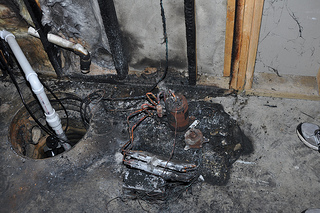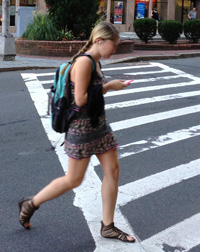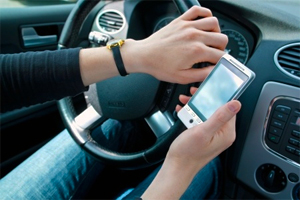Posts by Breakstone, White & Gluck
Attorney Marc Breakstone Comments in Massachusetts Lawyers Weekly Article: “Too Much Information? Lawyers Split Over Online Juror Surveillance”
 Massachusetts Lawyers Weekly writes this week about the divide among lawyers on monitoring social media use and Internet activities by jurors. It is a common practice, especially in Massachusetts, which does not allow attorney-conducted voir dire. There have been no ethical opinions on the subject issued in Massachusetts. Not all attorneys are comfortable with it, but some consider it fair.
Massachusetts Lawyers Weekly writes this week about the divide among lawyers on monitoring social media use and Internet activities by jurors. It is a common practice, especially in Massachusetts, which does not allow attorney-conducted voir dire. There have been no ethical opinions on the subject issued in Massachusetts. Not all attorneys are comfortable with it, but some consider it fair.
“I see no ethical issue. It’s in the public domain,” says Marc L. Breakstone, a Boston personal injury and medical malpractice lawyer with over 25 years of experience. “The public domain is the public domain. There’s certainly nothing wrong with checking the Internet. There would be a lot wrong with interacting with jurors or doing anything on the Internet to influence jurors with respect to the case.”
Breakstone later adds, “Trial lawyers are starving for information about jurors. The Internet is a potential treasure trove of information. Why wouldn’t a diligent trial lawyer inquire of that source? I would rather have voir dire, but without voir dire, this is all I can do.”
Read the full article online or view the PDF version.
Two Million Dehumidifiers Recalled for Posing Fire Risk
 If you own a dehumidifier, there may be a refund heading your way.
If you own a dehumidifier, there may be a refund heading your way.
Last week, 2.2 million dehumidifiers were recalled in the U.S., along with 52,500 units in Canada. The dehumidifiers pose a fire hazard and can overheat, smoke and catch on fire, according to the Consumer Product Safety Commission (CPSC). Consumers are advised to stop using them immediately and contact the manufacturer Gree Electric for a refund.
Gree Electric issued the recall for multiple brand names after receiving 165 incident reports, including 46 fires and $2.15 million in property damage. No injuries have been reported.
The dehumidifiers were sold under these brand names: Danby, De’Longhi, Fedders, Fellini, Frigidaire, Gree, Kenmore, Norpole, Premiere, Seabreeze, SoleusAir and SuperClima. The units sold for $110-$400 in various sizes and colors, from 2005 through last month.
The defective dehumidifiers were sold at Home Depot, Kmart, Lowe’s, Menards, Mills Fleet Farm, Sam’s Club, Sears and other U.S. and Canadian stores. They were also available through Amazon.com.
See a full list of the model numbers and how to obtain a refund.
One of the last major dehumidifier recalls came in 2011. LG Electronics recalled 98,000 Goldstar and Comfort-Aire dehumidifiers after they were linked to fires causing over one million in property damage. A home in Hudson, Mass. sustained $183,000 in fire damage. Homes were also damaged in Pennsylvania, Minnesota, Indiana, Ohio and New Jersey.
The Goldstar and Comfort-Aire dehumidifiers were first recalled in December 2009 following 11 incidents, including four fires. The company re-issued the recall in 2010 and 2011after receiving 16 additional reports of smoke and fire and nine significant fires. No injuries have been reported.
Check Your Home Appliances for Winter
The recall provides a good reminder to check your household appliances for fire hazards before the winter.
1) Make sure your appliance cords are covered and not frayed or ripped anywhere.
2) Check your smoke alarms and carbon monoxide detectors. You should have a smoke alarm in every bedroom and a carbon monoxide detector on every floor.
3) Check the CPSC website. Recently, the CPSC has announced recalls involving floor lamps sold at Target and ceiling lamps. Both products were recalled for posing a fire hazard.
Related:
Home Fires Prompt Dehumidifier Recall Reannouncement from LG Electronics, Consumer Product Safety Commission.
Target Recalls Threshold Floor Lamps Due to Fire and Shock Hazard, Consumer Product Safety Commission.
Ceiling-Mounted Light Fixtures Recalled by Dolan Designs Due to Fire and Shock Hazards, Consumer Product Safety Commission.
(photo credit: Consumer Product Safety Commission flickr)
Read More
Put Down the Cell Phone, No Walking While Distracted!
 Do you talk on your cell phone or read e-mails while walking? Many of us do. This practice – often called walking while distracted – can cause serious injuries to you and others around you.
Do you talk on your cell phone or read e-mails while walking? Many of us do. This practice – often called walking while distracted – can cause serious injuries to you and others around you.
There is good reason to think about pedestrian safety. After years of decreases, overall pedestrian traffic deaths have been on the rise in the U.S. In 2011, 4,432 pedestrians were killed in motor vehicle accidents, an 8 percent increase from 2009, according to the National Highway Traffic Safety Administration (NHTSA).
That same year, 1,152 people were treated in hospital emergency rooms for injuries from walking and using a cell phone or electronic device, according to the Consumer Product Safety Commission (CPSC).
Boston-based Liberty Mutual Insurance Company recently published a Pedestrian Safety Survey of over 1,000 adults. It reported 55 percent of respondents consider texting or e-mailing while crossing the street to be the most dangerous activity while walking.
This was even more than those who feel running across a street to beat oncoming traffic was most dangerous! Still, 60 percent of pedestrians reported texting, e-mailing or engaging in other behaviors while they walked, even though 70 percent considered the behavior dangerous.
Young people account for many of the distracted walkers. Safe Kids Worldwide, a non-profit organization, recently reported that it observed 34,000 children crossing the street near U.S. schools. One in five high school students and one in eight middle school students was distracted by a cell phone or electronic device.
A few tips for staying safe:
Put your cell phone away. Whenever you walk in a public area, put your phone in a bag or your briefcase. This includes supermarket parking lots, walking down the street on a sidewalk or waiting out at the bus stop with your child.
Don’t let the music distract you! Keep the volume low enough to hear traffic and other sounds around you. Do not adjust settings when crossing the street.
Step aside. It is best not to use your cell phone at all. But if you do, step away from the street and other pedestrians.
Crosswalks. Cars should stop at crosswalks for pedestrians, but do not take this for granted. Try and make eye contact with drivers before crossing the street and never pull out your cell phone while standing and waiting to use a crosswalk.
Never use a cell phone while crossing the street. This may sound obvious: Do not step into the street while you are reading or entering data or talking on your cell phone.
Watch out for bicycles. Cyclists can pass traffic on the right hand side and may be moving alongside traffic that has stopped. Be careful when stepping into the street.
Watch for other pedestrians. Realize that other people are probably going to be walking while using their cell phone and you have to anticipate them.
Related:
Put that phone down and just walk, The Boston Globe. Read More
Child Passenger Safety Week September 15-21

Many parents follow the law and fasten their children into child passenger safety seats. But the National Highway Traffic Safety Administration (NHTSA) says three out of four are doing it incorrectly, leaving children vulnerable to serious injuries.
There is a lot of confusion about child passenger safety seats. They are challenging for parents to position and laws change every few years. Additionally, each state has its own law. But they are important. Child safety seats reduce the risk of death for infants by 71 percent, according to the Centers for Disease Control and Prevention (CDC). The figure is 54 percent for toddlers ages 1 to 4.
September is a good time for parents to have their child’s passenger safety seat inspected for free. The NHTSA and communities across the country will hold Child Passenger Safety Week is Sept. 15 – 21. Sept. 21 is National Seat Check Saturday. You can search this database or this website to find a child seat inspection station near you (we suggest you call in advance to check).
There are inspection stations in Boston, Cambridge, Somerville and many other Massachusetts communities. These technicians should be certified and trained in the NHTSA curriculum. Some stations, such as local police departments, are often available to help parents throughout the year if you call for an appointment.
Massachusetts Child Passenger Safety Law
The Massachusetts Child Passenger Safety Law requires all children to use child passenger restraints until they are 8 years old or over 57 inches tall (4′ 9″). Up until 2008, the law only required children under 5 years of age and 40 lbs to ride in a safety seat.
There are four types of car seats: infant carrier seats, rear-facing convertible seats, forward-facing seats and booster seats, for children ages 4 until they are 8 years old in Massachusetts. When children turn 8 and are 57 inches tall, they can move into a seatbelt. The state recommends children travel in the backseat wearing a seatbelt until they are age 13.
Use of a booster seat reduces the risk of fatal injury for children ages 4 – 8 by 55 to 67 percent compared to unrestrained children and adults, according to a recent article in the University of Michigan Transportation Research Institute.
Another Change in Law May Be Coming
Another change may be coming for child passenger safety seats, but if so, the requirement will not be effective until February 2014.
The NHTSA has proposed that a child car seat be secured by a seat belt and top tether rather than the Latch system, according to the Wall Street Journal. In 2002, the Latch system became a federal requirement and new cars had to have anchor points between cushions so child safety seats could be secured.
The reason for the change is car seats were lighter a decade ago. Children were not required to use them for as many years as they are under today’s laws. The changes would include new labeling for car seats identifying the weight limits. The Juvenile Products Manufacturers Association represents child seat makers and is asking for the new requirement to be suspended and instead for the weight limits to be increased for the back seat anchors.
Related:
Please Put Down Your Cell Phone, Eliminate Driving Distractions for Back to School
 We suggest parents now talk to your children about the rules for getting to and from school safely. No skipping over the hard part: talking about when everyone, parents and children alike, should put down the cell phone.
We suggest parents now talk to your children about the rules for getting to and from school safely. No skipping over the hard part: talking about when everyone, parents and children alike, should put down the cell phone.
Walking to School. Encourage your child to use sidewalks and crosswalks with crossing guards or walk signals. Agree on a route with your child and never let them walk alone. Every year, drive or walk the route yourself so you can identify any problems.
Bicycling. Make sure your child wears a helmet – it’s the law and it’s common sense. While your child has many of the same rights as a driver, remind them to take it slow in parking lots or and when passing cars. They should learn to make eye contact with drivers in their vicinity–that way they can read the intention of the driver more clearly. Read about Massachusetts law for bicyclists.
Late Activities. It will get dark earlier now. Make sure you child has a safe way home after it gets dark. Consider picking them up or make other arrangements.
Reflective Clothing. If your teenager needs to walk at night or be near traffic, consider purchasing reflective clothing to keep at home. Many backpacks and sneakers have reflectors–look for products like that.
Ask Your Children to Put Away Their Cell Phone. When students are distracted, they may not be able to respond to drivers who are not using caution. Safe Kids Worldwide, a non-profit organization, recently reported that it observed 34,000 children crossing the street near 68 U.S. schools. Of these, one in five high school students were distracted by an electronic device. The rate was one in eight among middle school students.
The numbers are significant because pedestrian accidents involving teens age 16-19 have increased 25 percent over the past five years, Safe Kids Worldwide reports. This age group now accounts for about half of all pedestrian accidents among youth.
School Buses. At the beginning of the year, stand out at the bus stop with your children. Explain to them the appropriate areas to stand while waiting and how to board the bus.
Parents and Teen Drivers: Commit to No Distracted Driving
Finally, parents if you are driving, commit to putting away your cell phone. Texting while driving is against the law in Massachusetts and that includes viewing texts, e-mails or browsing the Internet.
Drivers need to eliminate distractions, especially when children are in the car, and especially in busy drop-off areas at schools, because car accidents can occur. This time of year, bus drivers and other parents who are driving are still getting used to their new routine and may not use proper caution when stopping or turning.
Also avoid using your cell phone while parked outside of schools or at bus stops waiting for your children – even just to make phone calls. An accident can happen in the instant you let your guard down and reach for your cell phone to view a text message or check in on a social media account.
If you have a teenager who drives, remind them not to use their cell phone while driving (this is the law in Massachusetts for junior operators). You have probably done so in the past, but explain the school parking lot is busy and there is no room for distracted driving. If they want to use their cell phone in a parking lot, suggest they park the car, get out and walk off the pavement first.
Related:
Distraction.gov
Filmmaker Explores Painful Consequences of Texting While Driving
For a free legal consultation, contact us at 800-379-1244 or 617-723-7676 or use our contact form.
Norfolk Propane Gas Explosion Leads to Federal Safety Alert
As a direct result of our client’s tragic death, a leading federal agency has issued a safety alert regarding nationwide measures to prevent catastrophic propane gas explosions.
On July 17, 2013, the U.S. Department of Transportation’s Pipeline and Hazardous Materials Safety Administration (PHMSA) published a national safety alert in the Federal Register which warns the public of the risks associated with under-odorization of Liquefied Petroleum Gas (LPG). It also advises shippers and carriers on recommended procedures for ensuring that LPG is properly odorized on all modes of transportation.
The PHMSA called the Norfolk gas explosion which killed Nichols and injured seven others the “most notable” of cases it considered.
On July 30, 2010, William Nichols, a 47-year-old electrician was working in the basement of an unfinished condominium at The Village at River’s Edge when it exploded. The structure was demolished. Nichols was buried under burning debris for 70 minutes and suffered burns over 80 percent of his body before he was rescued. Emergency workers responded from 21 nearby cities and towns. He died later that night at a Boston hospital.
The Nichols family was represented by attorney Marc L. Breakstone, of Breakstone, White & Gluck of Boston. In the lawsuit, the Nichols’ family alleged that EnergyUSA had negligently under-filled a new propane tank in the condominium development, causing the chemical odor which had been added to the propane to fade and become undetectable. When a loose fitting on the plumbing caused odorless propane gas to leak into the basement, Nichols and others were unaware of the extreme danger of working in the structure. When a hot water heater pilot ignited, the house exploded in a ball of flames. The remaining structure caved in on Mr. Nichols who was trapped in burning debris for over an hour.
During the litigation, Breakstone discovered that the propane supply company had intentionally under-filled the storage tank to save around $2,000. As a result of this, the chemical odorant in the gas faded out making the leaking gas undetectable.
The family settled its wrongful death lawsuit with EnergyUSA Propane and Smolinsky Brothers Plumbing and Heating for $7.5 million.
New Recommendations
Injection process. LPG is odorized through manual and automated injection. When it is odorized by manual means, the PHMSA recommends quality control checks be conducted. It recommends periodic equipment checks when LPG is odorized through automated means.
New tanks or freshly cleaned tanks. The PHMSA recommends those who fill LPG tanks use quality control measures that ensure LPG has sufficient odorant when it is delivered to end users. It also recommends people who receive new or recently cleaned propane tanks be notified.
Odorization standards. PHMSA recommends that all LPG transported in rail tank car tanks or cylinders be odorized in accordance with the requirements of § 173.315(b)(1), of the Hazardous Materials Regulations, issued by the Department of Transportation.
Read the regulations here.
About Breakstone, White & Gluck
Breakstone White & Gluck has over 100 years of combined experience successfully representing the seriously injured. To learn more, visit our website at www.bwglaw.com.
Court Ruling on MedPay Coverage Favorable to Massachusetts Drivers
 The Supreme Judicial Court recently issued a ruling favorable to Massachusetts drivers on the subject of medical payments coverage in the standard Massachusetts automobile insurance policy.
The Supreme Judicial Court recently issued a ruling favorable to Massachusetts drivers on the subject of medical payments coverage in the standard Massachusetts automobile insurance policy.
Medical payment coverage, often called MedPay, is one of eight optional coverages which drivers can purchase on their auto insurance policy. All Massachusetts drivers are required to purchase compulsory coverage, which includes $8,000 in Personal Injury Protection (PIP) benefits. They can also purchase other optional coverage types, such as MedPay. This pays co-pays and deductibles not covered by PIP benefits and medical services not covered by your health insurance policy.
In Golchin vs. Liberty Mutual Insurance Company, SJC-11305, the plaintiff suffered serious personal injuries traveling as a passenger in her husband’s car. Her medical expenses exceeded $100,000.
The car was insured by Liberty Mutual and the policy had up to $25,000 in optional MedPay benefits. Golchin had a health insurance policy with Blue Cross Blue Shield, which paid her medical bills (expenses totaled $100,883, but Blue Cross actually paid $32,033). Blue Cross placed a lien in this amount on any award Golchin received from her car accident case.
Golchin submitted documentation of medical expenses to Liberty Mutual, seeking coverage under MedPay. The insurance company refused the payment, claiming it was not required since Blue Cross had already paid the bills. When she settled her personal injury case, Golchin had to pay Blue Cross $32,033 out of her award to satisfy the lien, even though she had MedPay coverage.
Golchin filed her lawsuit in Worcester Superior Court in September 2008, alleging a breach of contract, a breach of implied covenant of good faith and fair dealing, and a violation of G.L. c. 93A, § 2.
In its August 8, 2013 decision, the Supreme Judicial Court held that Liberty Mutual could not avoid the payment of the medical payments coverage, and that the standard Massachusetts auto insurance policy provided for payments to the insured even when the health insurance company had made the payment.
There was certainly no unjust enrichment of the plaintiff in this case; all she got is what she had already paid for, and the auto insurance payment will only replace some of what was paid to the health insurance company to satisfy its lien.
Did you know that health insurance companies can recover their payments from your bodily injury claim? Most clients are stunned when they realize that their health insurance company can demand repayment of the bills that they paid. So even if you have great health insurance, the company will claim a lien on any personal injury case you have, and has the right to get paid, even before you do, and even if the settlement amount is not enough to cover all of your damages. Some insurance companies will negotiate their liens; others are not so sympathetic. Medical payments coverage on an auto policy is a good way to insure against lien repayments, and the cost of the coverage is very low.
Do you have MedPay coverage?
Ask your auto insurance agent if you have MedPay coverage. To learn more, read: Understanding and Buying Massachusetts Car Accident Insurance.
Read More
Filmmaker Explores Painful Consequences of Texting While Driving
We want to share a story we heard on NPR this morning. Texting while driving remains one of the leading safety hazards on our roads today, despite years of public service announcements, educational campaigns and media stories of tragedy.
German filmmaker Werner Herzog has now released a new and less traditional public service announcement. In an in-depth 35-minute film, he speaks to victims, families, law enforcement and drivers who made the mistake. In one case, he shows the daughter of a victim reunited with the driver who killed her father. In another case, a woman who was seriously injured by a texting driver faced more than a million dollars in medical bills.
The film is called, “From One Second to the Next,” and can be viewed below. It is part of the AT&T “It Can Wait” campaign.
In the NPR interview, Herzog said: “The message is very, very simple. Don’t text and drive.”
https://www.youtube.com/watch?v=_BqFkRwdFZ0
Read More
Bicycle Helmet Vending Machines Coming to Boston
 Safety is about to get more convenient for Boston cyclists. The City of Boston is bringing bike helmet vending machines here later this month.
Safety is about to get more convenient for Boston cyclists. The City of Boston is bringing bike helmet vending machines here later this month.
Boston is the first U.S. city to offer this service and the goal is aimed largely at helping riders of the Hubway bike share program. The city, in partnership with Alta Bicycle Share, launched Hubway in 2011. Today, there are more than 1,000 rental bikes in Boston and also Cambridge, Somerville and Brookline.
The first bike helmet vending machine will open Aug. 26 at a ribbon-cutting ceremony outside the Boston Public Library in Copley Square. It will be attached to a Hubway bike station. Other vending machines will be installed in additional areas.
How Will It Work?
Cyclists will be able to purchase or rent the bike helmets. Cyclists can either buy a helmet or pay $2 to rent a helmet for up to 24 hours (pricing is still being finalized). After that, their credit card will be charged to buy the helmet for about $20 (pricing is still being finalized there too). When helmets are returned, they will be taken to a warehouse for inspection and cleaned before going back into the machines. The helmets were designed by HelmetHub, formed by a group of MIT students as a class project.
Next Step a Boston Bike Helmet Law?
Massachusetts only requires cyclists who are 16 years old or younger to wear bike helmets. But in many areas, they are encouraged for all riders as protection against head injury.
One study reported 80 percent of bike share riders in Boston are not wearing helmets. The study by Beth Israel Deaconess Medical Center researchers reported the same figure for Washington D.C. Riders who owned their own bikes wore helmets about half the time.
The City of Boston has worked to encourage bike helmet use by subsidizing helmets for $7.99 and making them available at stores throughout the city. City officials announced a few months ago that their long-term goal is to pass a bike helmet law for Boston, which would require cyclists of all ages to wear helmets in the city.
Our Bike Helmet Donations for Children
The Boston bicycle accident lawyers at Breakstone, White & Gluck have over 90 years combined experience representing injured cyclists. We are proud supporters of the Boston cycling community. In 2013, we donated 1,000 bike helmets to children through programs such as Mayor Menino’s Boston Bikes Roll It Forward, CYCLE Kids of Cambridge, the Somerville Kiwanis Club and Winter Hill Community School and the Dedham Bike Rodeo.
If you have been injured in a cycling accident, it is important to learn your rights. For a free legal consultation, contact us at 800-379-1244 or 617-723-7676 or use our contact form.
Swimming Pool Safety for Families
 Many of us will spend the last few weeks of summer by the pool, with family and friends, at a slower pace. Relax and enjoy it, but also remember you have responsibilities if young children are around the pool. When a child is left unsupervised, tragedies can happen quickly, sometimes within seconds. In fact, a child who is submerged under water can lose consciousness within just two minutes. Within four to six minutes, permanent brain injury can occur.
Many of us will spend the last few weeks of summer by the pool, with family and friends, at a slower pace. Relax and enjoy it, but also remember you have responsibilities if young children are around the pool. When a child is left unsupervised, tragedies can happen quickly, sometimes within seconds. In fact, a child who is submerged under water can lose consciousness within just two minutes. Within four to six minutes, permanent brain injury can occur.
Swimming pool drownings are preventable. If parents, family and friends at the pool work together, you can keep swimming a safe and fun experience for young children.
Our injury attorneys share a few safety reminders:
Watch Young Children. Never leave your child alone in the water or near the water. That includes kiddie pools. At the pool, set aside all distractions: your cell phone, magazines and engaging conversation.
Take a Break from Distraction. If you become distracted or fatigued while watching your child, take a break. Ask them to come out of the pool for a little while.
Swim with your Child. Practice “touch supervision” with young children and keep them within reach at all times. As your child gets older, enroll them in swimming lessons. Make a point to get in the pool with them regularly. You can evaluate their strength as a swimmer best from the water and show them how to handle the water around other children.
Swim with a Buddy. Make sure your child knows they must always swim with someone else.
Lifejackets and Floats. Flotation tubes and rafts are not intended to support your children. To give your child extra protection, explore the U.S. Coast Guard website for information on personal flotation devices.
Lifeguards. At community pools, take note of the lifeguard stations and ask how many lifeguards are on-site. But do not rely on the lifeguards. Watch your own children.
Explain the Safety Rules to Your Child. Explain the rules of pool safety often to your child so they understand your priority is to keep them safe.
Not a Parent? If you are not a parent, listen to what your friends or relatives are telling their children. Be aware of their concerns and try to help create a safe pool environment.
Read More

